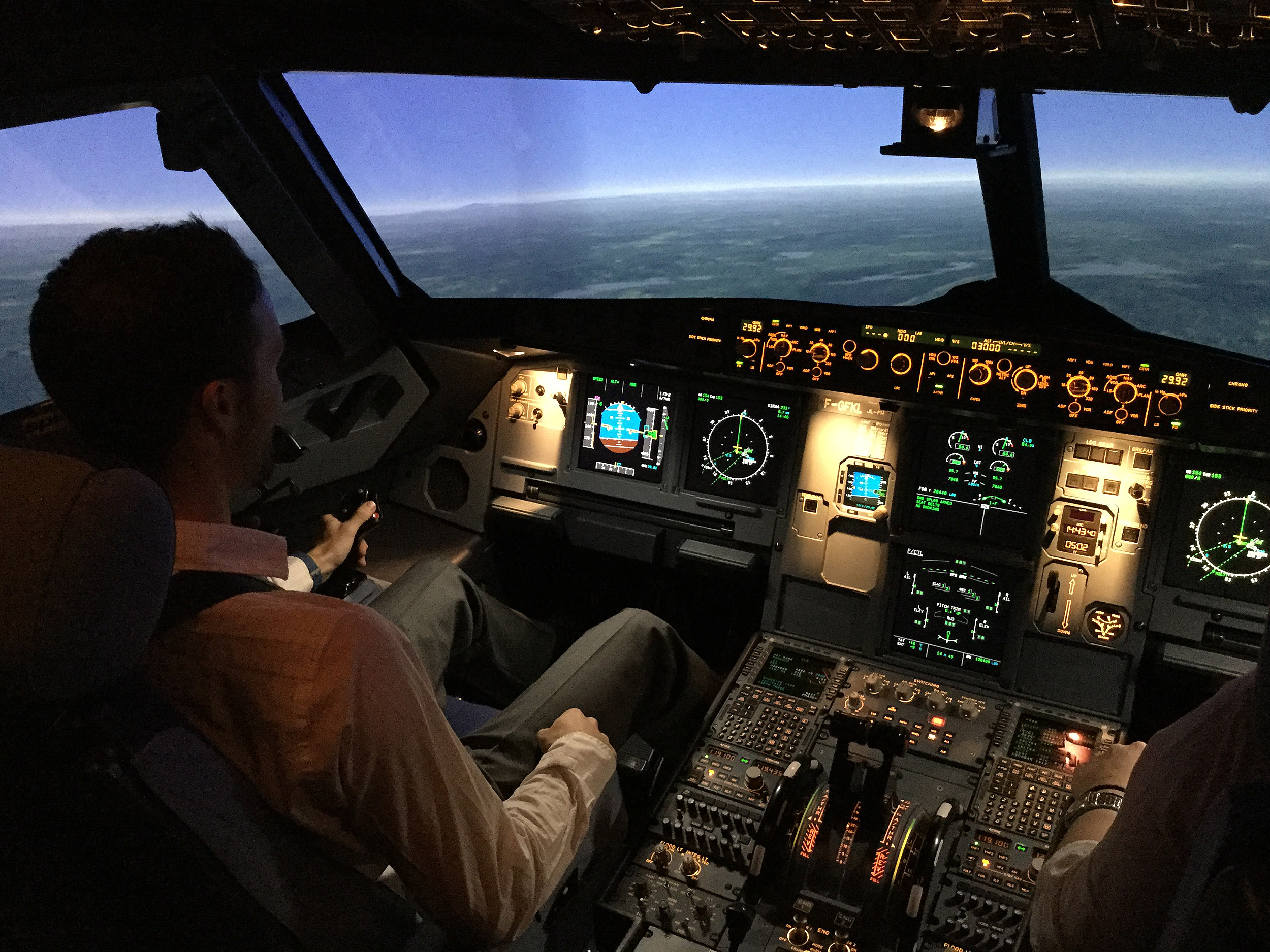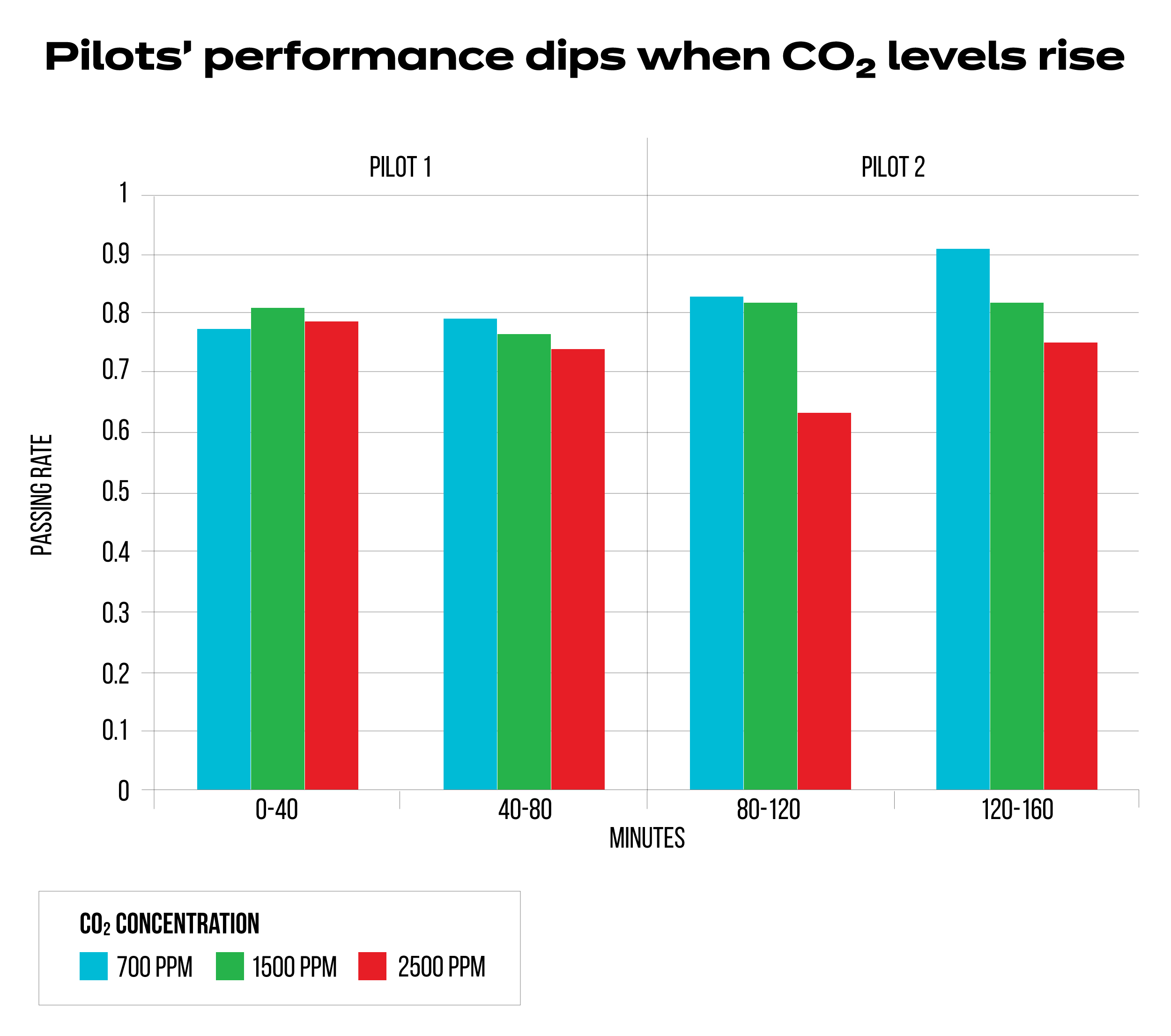
A Harvard Chan School study examined how cockpit carbon dioxide levels impacted pilot performance, finding a negative correlation between the two.
Courtesy of the Healthy Buildings team at HSPH
Research links air quality, air safety
Harvard Chan School investigators see dip in pilot performance when carbon dioxide levels rise
On Jan. 15, 2009, Capt. Chesley Sullenberger carefully glided his US Airways Airbus A320 onto the Hudson River minutes after the plane lost both its engines. The miraculous touchdown saved all 155 passengers and crew. On the tape of his exchange with air traffic control, Sullenberger could be heard calmly working to avert catastrophe.
Pilots face extreme pressure, both on the tarmac and in the air, and their ability to focus is critical to the safety of all those on board. But what happens to their performance when the air quality in the cockpit is less than ideal?
In a study by investigators at the Harvard T.H. Chan School of Public Health, a pilot’s ability to perform well on a series of stressful maneuvers dipped when levels of carbon dioxide on the flight deck rose. The research, supported by a gift from United Technologies to the Chan School’s Center for Climate, Health, and the Global Environment, was published last week in the Journal of Exposure Science and Environmental Epidemiology.
“We wanted to explore if we are doing everything we can to optimize pilot performance with regard to the air they are breathing on the flight deck,” said Joe Allen, an assistant professor of exposure assessment science and principal investigator of the study. “And we think CO2 levels are part of that equation.”
Allen has spent years exploring how air quality affects on-the-job performance. A set of 2015 studies he led in collaboration with Syracuse University and SUNY Upstate Medical University found that CO2 levels and ventilation can affect cognitive function.
Comparison of passing (green) and failing (red) flight paths of pilots circling to land around New York City with an inoperative glide slope — the most difficult maneuver in the study.
Courtesy of the Healthy Buildings team at HSPH
The new study, an initiative of the School’s Aviation for Health program, “combines our aviation work with the work we have been doing on indoor environments and helps shine a light for the first time on the air quality of the cockpit and how it can affect pilot performance,” said Allen.
The research included a series of tests conducted in an A320 flight simulator with 30 commercial airline pilots. During three flight segments of three hours each, pilots were tested without the aid of autopilot. Their performances were assessed by a Federal Aviation Administration-approved pilot examiner.
The FAA says that ventilation systems should maintain CO2 levels of 1,500 parts per million in the main cabin, but safety rules regarding cockpit access have made in-flight studies nearly impossible, limiting researchers’ understanding of CO2 concentrations on the flight deck. In one of the few authoritative studies, the European Aviation Safety Agency last year released air-quality measurements from the cockpits of 69 commercial airliners, including eight B787s. The mean CO2 concentration on the B787s was 603 ppm, compared with 835 ppm for the other planes.
For each test, Allen and his team adjusted simulator CO2 levels to 700, 1,500, or 2,500 parts per million. The researchers took pilots through standard operations as well as a set of more difficult procedures, like landing an aircraft without one engine, a scenario similar to that faced by Capt. Tammie Jo Shults in her emergency landing of a Southwest Airlines plane in April.
Source: “Airplane pilot flight performance on 21 maneuvers in a flight simulator under varying carbon dioxide concentrations,” Joseph G. Allen, Piers MacNaughton, Jose Guillermo Cedeno-Laurent, Xiaodong Cao, Skye Flanigan, Jose Vallarino, Francisco Rueda, Deborah Donnelly-McLay, John D. Spengler

Performances slipped as CO2 concentrations rose. The study notes that the “odds of passing a maneuver was 1.69 times larger when pilots were exposed to 700 parts per million compared to 2,500 parts per million,” and that at “1,500 ppm, the odds of pilot passing were 1.52 times higher than at 2,500 ppm.” In addition, “five of the seven most difficult maneuvers (steep turns, rejected takeoff, circling to land, landing with slat malfunction, and collision avoidance) showed higher passing rates at 700 ppm relative to 1,500 ppm.”
The bottom line, said Allen, is that “pilots perform better when there are low concentrations of CO2 on the flight deck.”
Study co-author Deborah Donnelly-McLay, a commercial pilot who connected with Allen while she was pursuing her master’s degree in history at the Harvard Extension School several years ago, helped recruit pilots for the research. She said finding willing test subjects wasn’t hard.
“They were aware that research in the cockpit was lacking and so they were very happy to participate and to learn that somebody was looking into this and that something was being studied to benefit them,” said Donnelly-McLay.
A pilot for 30 years, Donnelly-McLay expects the work to make an impact.
“I think the key message for the aviation community, including the pilots, is that air quality is an important component of flight safety, which is of course everyone’s the final goal,” she said. “So any additional knowledge that we can bring to help support this goal just benefits everyone.”
Allen said that the study could help inform how the airline industry and regulators approach ventilation standards.
“Similar to our research on workers in office buildings, we are now asking the same question about pilots on airplanes — how can we leverage the power of better indoor air quality to optimize human performance?”
Other co-authors on the study were Xiaodong Cao, Jose Guillermo Cedeño-Laurent, Skye Flanigan, Piers MacNaughton, Francisco Rueda, John Spengler, and Jose Vallarino.




